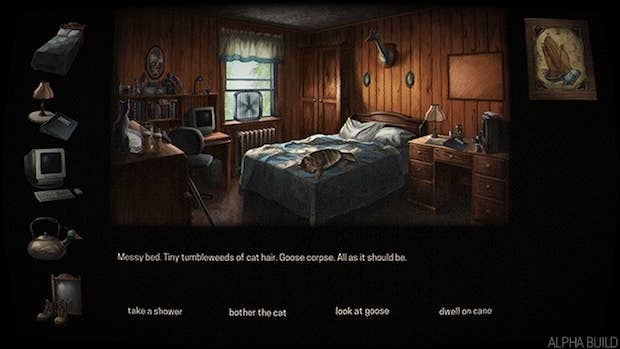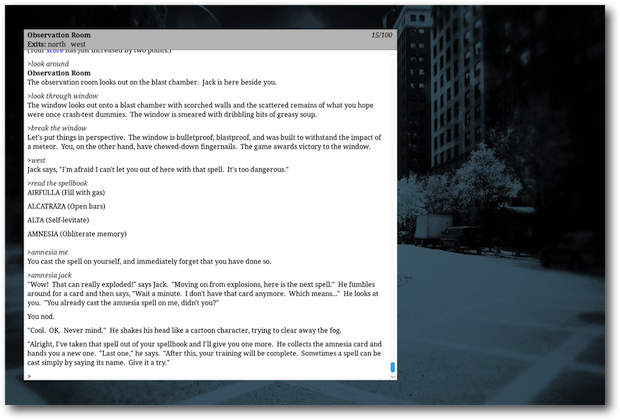IF Only: Thaumistry and Southern Monsters on Kickstarter
Two IF works on Kickstarter

Kevin Snow's work is notable for drawing strongly from specific cultures and folklore traditions. Snow's two previous works, Domovoi and Beneath Floes, take on folk tales from Slavic and Inuit culture respectively. For Beneath Floes, he collaborated with the Nunavut-based game studio Pinnguaq (Singuistics, Qalupalik), which is why the game is also available in Inuktitut.
Both Domovoi and Beneath Floes deploy illustration as well as text; both show a taste for the uncanny as opposed to the simply horrific. Beneath Floes overlaps the supernatural threat and the threat that comes from our own failings and guilt; and while I enjoyed Domovoi, I thought Beneath Floes was more mature, more complex, and better written.
Now Southern Monsters promises to be Kevin's biggest and most personal work yet, and it's on Kickstarter and Steam Greenlight.
Here's the description:
Southern Monsters is set across five days in 2005. You play as cripplefoot, a traumatized teen too young to make sense of his emotions. To find the monster, you'll need to strike a balance between cryptid research and cripplefoot's well-being before the dry Arkansas sun sets.
Southern Monsters is deeply personal. It's a dark comedy based on my experiences with online communities, domestic abuse, and being disabled in the weird, weird South. It's also imbued with my love of horror movies like Videodrome, Suspiria, and Eraserhead.
I've mentioned it on RPS before as a game I was particularly looking forward to at the end of 2016, and now I'm even more excited about where it's going. Partly that's because I like the premise, a blending of the real and the unreal, and the representation of a protagonist with a disability. Partly it's the setting, a place not always very effectively explored in games. Partly it's because Snow's trajectory as an author suggests that this piece may be really stunning. Partly it's that there's always a special power to what an author writes when they come home to their own culture for inspiration.
*
Bob Bates is a veteran of interactive fiction: for Infocom he wrote Arthur: The Quest for Excalibur and Sherlock: The Riddle of the Crown Jewels; for Legend, Timequest and Eric the Unready. (For a deeper dive into Bates' work and his career at these two companies, I recommend — as I really would always recommend — the Digital Antiquarian writeup. Digital Antiquarian has been covering the history of adventure games with attention to the business, cultural, design, and technical perspectives, and it's a first-rate read.)

Bates is now launching Thaumistry: In Charm's Way on Kickstarter. The game is already substantially complete, with some bug-fixing and embellishments still to do. The text is bubbly and cheerful, and the Kickstarter video pulls in familiar adventure luminaries Tim Schafer and Steve Meretzky.
Bates was kind enough to share a preview version of the game with me, so I've had a chance to play with it. The opening has quite a few style characteristics of the old days: a parser that makes a little fun of the player; solid, reliable implementation; self-aware humor about the nature of text adventure protagonism; and riffing on the sillier aspects of business and experimental science. Now and then the parser addresses the player directly in Bates' own voice, chiding you for attempting something ridiculous or unsuitable.
Thaumistry's premise is that the world contains inadvertent magic users called Bodgers who cause things to go slightly wrong — but often in ways that ultimately lead to greater improvements. As in Infocom's Enchanter series, the player collects spells in a spellbook, but most are particularly bodgery spells, things that make small and potentially irritating adjustments to objects and processes. Much of the puzzle-solving, as well as the Easter-egg fun, consists of finding places to apply these.
At the same time, Thaumistry has rolled in a number of the technical improvements of the post-Infocom age. Descriptions are more extensive than used to fit in the older systems. More of the scenery is described, in line with present-day text adventure expectations. And Thaumistry is written in TADS 3, a system with a complex and sophisticated library covering everything from physical interactions to character behavior. In the wrong hands, TADS 3 can feel laborious and over-modeled, but with a skillful implementor, it pleasingly smoothes out a lot of the potential irritations of the parser. Thaumistry makes good use of these features without hitting the player over the head with them. Try to open a door while you're holding the key, and it does the right thing rather than pedantically telling you the door is locked. Elevators work smoothly, allowing you to press buttons or just go UP or DOWN while inside. Non-player characters have a range of dialogue and idle actions available, but they will step out of the way during the more exploratory scenes to let the player get on with things.
Thaumistry even lets you turn the compass on and off, so you can rely on left/right/forward instead of compass directions if you prefer. Personally, I always find relative directions significantly more confusing than compass directions in a text adventure, so after swapping the mode briefly, I reverted to the old familiar mechanisms. But if you're a compass-hater, this game will accommodate you.
There's one other aspect of this Kickstarter that might appeal even to players who aren't into the premise of Thaumistry specifically. If it meets its stretch goals, these would cover porting TADS 2 and 3 interpreters to iOS and Android, and making those interpreters publicly available.
In practice, that means that not only would Thaumistry be available on these platforms, but a number of other parser IF games built on the TADS engine would be newly playable on a wide range of mobile devices. That includes Suzanne Britton's massive science fiction story Worlds Apart; Ian Finley's eerie Babel; the lyrical Sunset Over Savannah by Ivan Cockrum; much of Eric Eve's substantial back catalog; and hundreds of other games including many classics of hobbyist interactive fiction from the 1990s.
*
Further recommendations: for those who want a piece of commercial IF to play now rather than in a few months' time, Interactive Fables' Worldsmith is now available on itch.io on a pay-what-you-like basis.
If you're excited by the prospect of some cryptid-based IF, you might also like Robb Sherwin's huge and ambitious parser game Cryptozookeeper.
And finally, if you want to see how elegant TADS 3's world implementation can be, I recommend Return to Ditch Day, a puzzle game by Michael J. Roberts, the creator of TADS. It's a solid puzzle work with a lot of familiar parser frustrations polished away.
Disclosures: Emily has met Bob Bates, Michael J. Roberts, Robb Sherwin, Eric Eve, Ivan Cockrum, and Ade McT, the author of Worldsmith. More generally, Emily Short is not a journalist by trade and works professionally with various interactive fiction publishers. You can find out more about her commercial affiliations at her website.